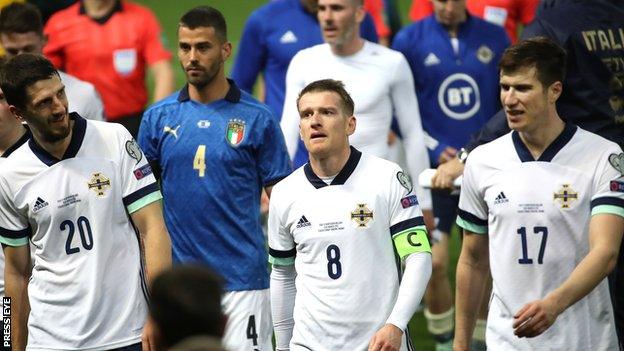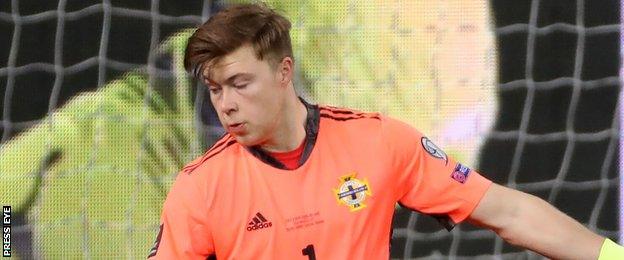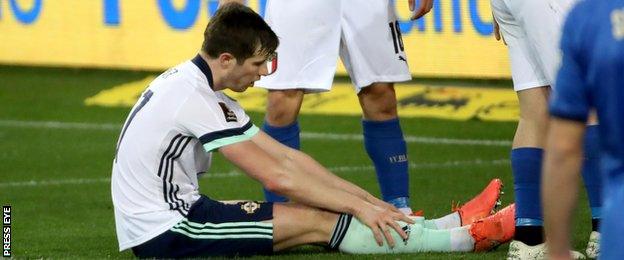World Cup qualifiers: Revival encouraging but Northern Ireland must commit to system from the start
- Published

A record-equalling night ended in defeat for NI captain Steven Davis
On paper, it was a bold formation. In practice, it was anything but during an opening half in Parma that could have been a lot more damaging than it ultimately was.
While not immediately obvious when the teamsheets first came in, Northern Ireland manager Ian Baraclough declared in his pre-match interviews that he was going in with "two willing runners up front". So, 3-5-2 it was then.
Starting with two central strikers away to Italy takes courage at the best of times, but particularly when they have not lost in 22 matches while your own team's record reads no wins during 90 minutes from eight.
While Baraclough had given a nod to this system in previous selections, it was still a major talking point when Hull City pair Josh Magennis and and Gavin Whyte - a flying winger by trade - lined up alongside each other in attack against the four-time world champions.
As Thursday's opening World Cup qualifier got underway, Northern Ireland were looking energetic and compact, with Whyte's pace and trickery getting him in behind the home defence as early as the fourth minute.
That positivity lasted no more than 10 minutes, however, as Baraclough's men began dropping unnecessarily deeper, allowing the hosts to assume the swagger that has become a hallmark during their renaissance under Roberto Mancini.

Bailey Peacock-Farrell was at fault for the Italians' second goal
It appeared that Northern Ireland's players were not committed strongly enough to the system, with Whyte and Magennis spending more time in their own half trying to prevent Manuel Locatelli pulling the strings from the base of Italy's midfield.
Whether by accident or design, this had a knock-on effect on the rest of the team, with every component often at least five or six yards deeper than they needed to be, leaving their opponents unopposed to inflict pain with their incisive passing.
"We were too passive in the first half in our pressing and we did not have the intensity that we had spoken about before the game," Baraclough observed after the match.
That lack of intensity was a factor in Domenico Berardi and Ciro Immobile firing goals that, as the half-time whistle blew, looked like being the launchpad of a comprehensive home victory.
Regrouping leads to revival
"Once we spoke about it at half-time, I felt the second half was a totally different type of game," Baraclough continued.
"We pressed, we caused mistakes, we created chances from that which is something we spoke about, and I think we had a bit more belief in ourselves as a group of players."
That Baraclough could be giving these views at the end of the match would have seemed implausible at half-time, but the regrouping his side carried out during the break clearly worked.

Paddy McNair missed a late chance for Northern Ireland
With Magennis and Whyte linking up for the first time to set up the former Crusaders man for a volley immediately after the restart, the tone was set for a second 45 minutes that restored a significant amount of pride in a World Cup qualifying bid that was only just getting underway.
All over the pitch the players in white shirts were on the front foot, giving their opponents no time in possession and at times taking enough care of the ball to create opportunities to claw their way back into a game that seemed lost.
Essentially, they began to resemble the Northern Ireland team that supporters have embraced since the upwards curve began during Euro 2016 qualifying. Whyte and McNair came close - the Middlesbrough man should really have scored - but the heavy defeat that was threatened at half-time had been averted.
Results can't continue to drift
"The players are disappointed that we didn't take it into the last 10 or 15 minutes at least where it could have been a little bit tricky for Italy," the NI manager reflected.
"Maybe it is a chance gone but these are not the games we will be judged on. We need to take that intensity from the second half into our next qualifying game against Bulgaria."
Baraclough was correct, of course. Italy away would never be a fair match on which to judge any Northern Ireland boss, and especially not this Italian team riding the crest of a wave.
However, the numbers do not go away. That is now no wins during 90 minutes for Baraclough during his first nine matches in charge of the senior international side.
A friendly against the USA that is sandwiched in between two World Cup qualifiers may be seen as something of an inconvenience by some, but Northern Ireland don't half need a win.
Bulgaria is clearly the game that matters, but the current drift in results needs to end, and end soon.